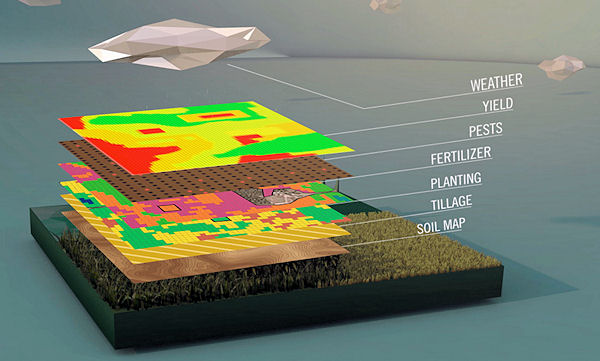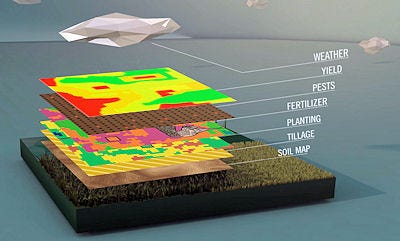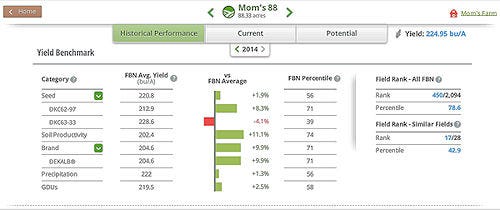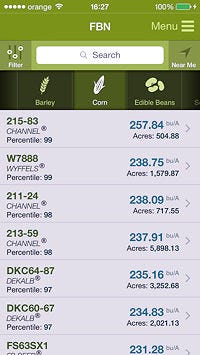April 2, 2015

Earlier this year I wrote a story about Silicon Valley coming to agriculture, because we're seeing more startups and new firms leveraging farm information to help you do better; and they're often funded by companies better associated with Google or Facebook.

Farmers Business Network can take participating farmer information and other data layers to help with decision-making. Aggregating data from more than 10,000 fields covering more than 5 million acres offers the potential for a range of useful field and input performance information.
During Commodity Classic I came across a firm - Farmers Business Network - that's providing farmers a way to take the information they gather and get more value from it. All the while, the group says that farmers maintain ownership of their information, but as part of the FBN the data is aggregated in a way to help with decision-making.
How can this be? Turns out your data is probably helpful to some extent without you sharing it off the farm. You can see how hybrids performed across your soil types and how population affected your yields. Or you can compare different fields in new ways with all the information you gather.
Aggregating your data with others - while removing anything that says the data is yours - has a greater value. What if you could compare a specific hybrid for a wide range of farms with your soil type? That would be better than just getting information from a couple fields. What might appear as a strong performer one year on your farm, may be a looming failure if you plant it this year. Multi-farm information can make provide transparency to those kinds of decisions.

Utilizing information aggregated from so many farms offers members of FBN the opportunity to see just how a specific hybrid might perform on their farm given like soil types and similar growing conditions. Note that one hybrid (shown with red graphic) might not be the best choice for THIS farm, but other choices exist.
FBN, which now has 10,000 fields and over 5 million acres of data, contributing to the service, provides an easy way for farmers to move data from farm to the cloud, and get useful information back. "We handle the process for the customer," says Charles Baron, cofounder of FBN. "We're committed to providing useful information to the grower."
The key is benchmarking. That's the handy process of comparing your farm with others of like size and complexity. It's a common tool used for farm business management records (you can check out a great website for business benchmarking developed by the University of Minnesota Center for Farm Financial Management).
Benchmarking is common in industry today. Businesses want to know how they perform against peers using aggregated data. "When farmers see the information in our demo they have an 'aha' moment," Baron says. "We can take data from all different formats and standardize it on this platform."
Baron adds: " FBN's core innovations are the ability to analyze multiple layers of data together (planting, fertility, yield, soil etc.), and the ability to network thousands of fields together for even greater analysis. Our mission is to put the power of this information back into the hands of growers. We describe ourselves as a farmer-to-farmer agronomic data network. Our core services are input and practice analysis, benchmarking, and seed selection. So while benchmarking is a central part of FBN, the system is constructed to reveal the insights and power of networking farm data - all for the farmer's benefit."
Apps and benchmark tools
It's interesting to look at how FBN "sees" farmer data. There's an image on this page showing the many layers of data and how the firm does analysis inside of each field. The company has developed tools like Seed Rankings as an app while the web site offers Field Benchmarking.

With all the information aggregated, it's possible - using the FBN Seed Finder App - to rate hybrids on their potential performance in your own field. Subscribers share their data, which is aggregated to create such decision-making tools.
FBN Seed Finder app for Apple devices can show you best performing seeds in the network and your region. The app can also show yield results by population for every variety, based on yields reported by network members. The app is available for Apple devices (Android apps version is in the works)
For benchmarking the FBN's Field Benchmarking compares and ranks each field against similar fields in the network. You can benchmark seed, soil, weather and practice performance and see how your fields rank nationally among all network participants. This mini scorecard can offer ways to identify opportunities for improvement.
And finally FBN's Field Potential product can actually identify the best performing seeds for each field. The aim is to show true yield potential.
This is heady stuff, turning real-world farm information from more than 10,000 fields into actionable information farmers can apply to their fields. And the cost? It's a $500 annual fee no matter how big your farm.
You can learn more about the program by visiting farmersbusinessnetwork.com and there's a video you can watch too that offers added insight.
Baron sums up FBN's focus simply: "FBN is all about the power of what becomes possible when growers share data."
You May Also Like




